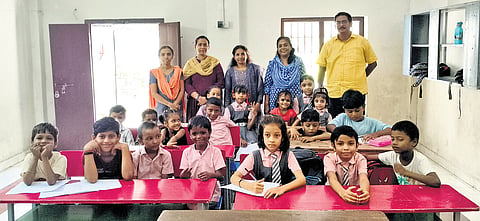

KOZHIKODE: Walk into the Byraikulam Government Lower Primary School in the heart of Kozhikode city, and you might hear more Hindi than Malayalam in its corridors. What was once a small neighbourhood school for local children has over the years transformed into a vibrant classroom filled with the voices of migrant students from across northern India.
“I’ve been teaching here for around 10 years. When I joined, there were around 10 students, a mix of Malayali and migrant children. Now, nearly all our students are children of migrant workers,” Geo Jaison, a teacher at the school, told TNIE.
The rising number of migrant labourers in Kerala — from states like Uttar Pradesh, Bihar, and West Bengal — has brought a parallel rise in students enrolling in local government schools. “Whether it’s a restaurant, a construction site, or a barber shop, workers from the northern states are everywhere. And now, so are their children,” Jaison said.
This year, for the first time in years, three Malayali students joined the school. “They mingle well. The Malayali children pick up bits of Hindi, while the others learn Malayalam,” said Byraikulam school headmistress Deepthi K P.
The teachers have adapted too, often blending Malayalam and Hindi while teaching and communicating with parents. “At PTA meetings, we mostly speak in Hindi because many parents don’t understand Malayalam,” Deepthi said.
Families who send their children to local schools are typically those who have settled down with their families.
“Some parents run small businesses and are doing okay, while others are street vendors from very poor backgrounds,” said Sumi S, headmistress of the Achuthan Girls’ LP School, Chalapuram, where around 30 students are children of migrant workers.
Despite the challenges, many of these children quickly become fluent in Malayalam. Some are even acting as translators for their parents during school calls. “They can read, write, and speak like native speakers by the time they complete primary school,” Sumi noted.
To support them, the government introduced the ‘Meethi Malayalam’ programme, in which teachers of schools with a high migrant student population are trained to make Malayalam learning easier, helping the students to integrate more smoothly into the local environment.
While many children continue their studies beyond lower primary, some families leave abruptly. “Sometimes, a student stops coming to school. When we finally get in touch, we’re told they’ve gone back home,” Deepthi said.
Yet, for those who stay, Kerala is becoming a second home. “There’s work here and there are good schools for my children. That’s why I like it here,” said Raju, a labourer from Mathura now living in Chalapuram.
As more migrant families put down roots in Kerala, schools like Byraikulam GLPS and Achuthan Girls’ LPS are quietly becoming places of connection and change, bridging the gap between cultures.
It is not always easy, and some families leave as suddenly as they arrive. But for those who stay, Kerala offers not just work but a chance at belonging, and for their children, a future written in both Hindi and Malayalam.